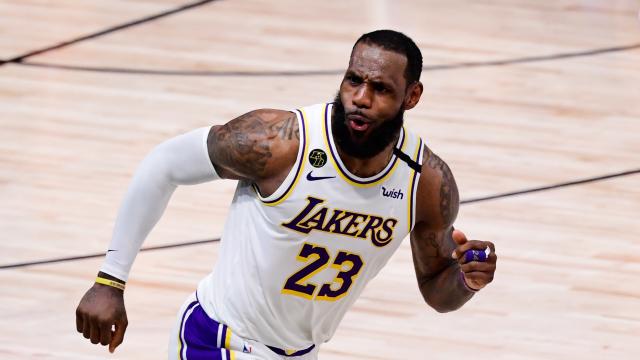The 2020/2021 NBA season is slated to begin later this month, just 71 days after the last season ended. That’s not only the shortest offseason in NBA history, it is also the shortest offseason ever across much of pro sports, including the NFL, NHL and MLB, as ESPN reported in November. The 2019/2020 NBA season was an anomaly capped off by a playoff tournament held in Orlando from inside a secure “bubble” to prevent infection from spreading between players and staff. The forthcoming campaign will necessarily be marked by a similar degree of weirdness shaped by the still raging pandemic.
The NBA will be charting new territory when the season kicks off on Dec. 22. Here’s how the league is accounting for all the uncertainty that goes with playing basketball during a viral outbreak.
It’s a shorter season
The NBA and the U.S. National Basketball Players Association (the union representing NBA players) struck a deal governing the new season’s rules on Nov. 9. One of those rules was to shave the season down from its usual 82 games to 72.
The league plans to release the season’s schedule in two phases. The first half of the schedule was released at the start of team training camps earlier this month, and the second half is poised to be issued while the first section of games is being played. Fittingly, the league is calling the two portions of games The First Half and The Second Half.
The makeup of games will see teams playing more frequently against rivals in their own conferences, while still carving out times for less frequent intra-conference games.
As the NBA officially puts it:
For now, the plan is for each team to play three games against each intraconference opponent (42 total), and two against each interconference opponent (30 games).
Unlike the reimagined 2020 season, there won’t be a bubble. Teams will be travelling the country as they normally do, albeit playing in empty or sparsely populated arenas once they arrive.
Unconventional approaches abound
In an effort to cut down on travel, the NBA is drawing upon the wisdom of Major League Baseball. This will entail travelling teams staying in cities of opposing teams a little longer, to play two games instead of one.
In an effort to reduce travel, teams will play what can be described as “baseball-style” series against opponents, with two consecutive games in the same city against the same team. Fans will get a small taste of that during the preseason, when there will be several repeat matchups between teams.
COVID safety protocols
The main issue behind the abbreviated season is keeping safe the players, coaching staff, and everyone else involved with the production of professional basketball. Daily testing of players and staff before all team and individual workouts already started on Dec. 1, but the remit of this program extends a lot further than practice. Perhaps the biggest and most consequential question is what threshold will need to be crossed to suspend a team’s travel and activity. As the league notes, a “small or expected” number of individual COVID cases won’t halt a team’s activity, but an outbreak among players or staff will.
The NBA further lays out its rules:
Anyone who tests positive will have two routes to return to work: go 10 days or more after the first positive test or onset of symptoms, or test negative twice at least 24 hours apart via PCR testing.
Any player who tests positive, even if asymptomatic, must wait 10 days and then be monitored in individual workouts for an additional two days.
Team travelling parties will be limited to 45 people, including 17 players, as they make their way around the country to play a home-and-road schedule in NBA arenas.
An anonymous tip line will be made available to report possible violations of safety protocols.
They playoffs will be different, too
This season, 8th-placed mediocrity will not automatically open the door to the playoffs. Instead of the traditional format, there’ll be a play-in to see who qualifies for that coveted final post-season slot. The playoffs will inevitably receive a shot in the arm, as teams finishing 7th through 10th in their respective conferences square off to earn a chance at the playoffs where they’ll probably lose to a better team down the line.
The league explains the revamped format:
At the conclusion of the regular season but before the first round of the playoffs, the team with the 7th-highest winning percentage in each conference will host the team with the 8th-highest winning percentage in a Play-In Game (the “Seven-Eight Game”). The winner of the Seven-Eight Game in each conference will earn the No. 7 seed.
The team with the 9th-highest winning percentage in each conference will host the team with the 10th-highest winning percentage in the “Nine-Ten Game”. The loser of the Seven-Eight Game will host the winner of the Nine-Ten Game in a Play-In Game, and the winner of that game in each conference will earn the No. 8 seed.
How will the changes affect All-Star weekend?
Will we still get to enjoy all the sick dunks and robotically drained three-pointers we love so much? This year’s All-Star weekend was originally planned to take place in Indianapolis in February, though that’s event has since been moved to 2024. So far, the league says that it will announce a revised plan for this year’s All-Star festivities, but nothing is certain just yet.
If you remain steadfast in your interest for all things pandemic basketball, keep your eyes glued to the NBA’s announcements, which will probably come thick and fast as hiccups inevitably arise.

Leave a Reply
You must be logged in to post a comment.